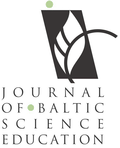IMPROVING SECONDARY SCHOOL BIOLOGY TEACHERS’ TOPIC-SPECIFIC PEDAGOGICAL CONTENT KNOWLEDGE: EVIDENCE FROM LESSON STUDIES
| Title | IMPROVING SECONDARY SCHOOL BIOLOGY TEACHERS’ TOPIC-SPECIFIC PEDAGOGICAL CONTENT KNOWLEDGE: EVIDENCE FROM LESSON STUDIES |
| Publication Type | Journal Article |
| Year of Publication | 2023 |
| Authors | Mapulanga, T, Ameyaw, Y, Nshogoza, G, Sinyangwe, E |
| Journal | Journal of Baltic Science Education |
| Volume | 22 |
| Issue | 1 |
| Start Page | 20-36 |
| Pagination | Continuous |
| Date Published | February/2023 |
| Type of Article | Original article |
| ISSN | 1648-3898 |
| Other Numbers | E-ISSN 2538-7138 |
| Keywords | enacted pedagogical content knowledge (ePCK), lesson study, respiration, secondary school, topic-specific pedagogical content knowledge (TSPCK) |
| Abstract | Since pedagogical content knowledge (PCK) influences the teaching-learning process, it has dominated research on teacher effectiveness. This case study explored teachers’ enacted topic-specific PCK (TSPCK) during the biology lesson study stages: planning, teaching, and reflecting. The enacted TSPCK in two video-recorded research lessons was analysed qualitatively. The results showed that the teacher enacted both high-order and low-order pedagogical actions in the enactment of the TSPCK on eight themes, namely: teaching strategies, classroom interactions, representations, curricular saliency, conceptual teaching strategies, students’ prior knowledge and misconceptions, and what makes teaching or learning difficult. The results also show that the teachers’ collective planned TSPCK was more developed than their personal TSPCK, indicating that participation in the lesson study improved the teachers’ TSPCK. The study is important as it shows how teachers enact their personal and collective TSPCK in respiration. It also demonstrates the potential of lesson study to improve teachers’ PCK through collaborative planning and reflection on taught lessons. The study recommends using lesson study to improve teachers’ enacted TSPCK in respiration, and biology as a whole. |
| URL | https://oaji.net/articles/2023/987-1676960436.pdf |
| DOI | 10.33225/jbse/23.22.20 |
| Refereed Designation | Refereed |
| Full Text |
